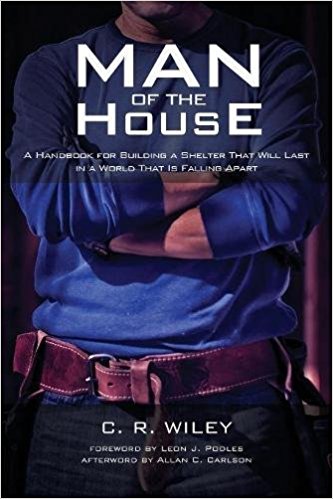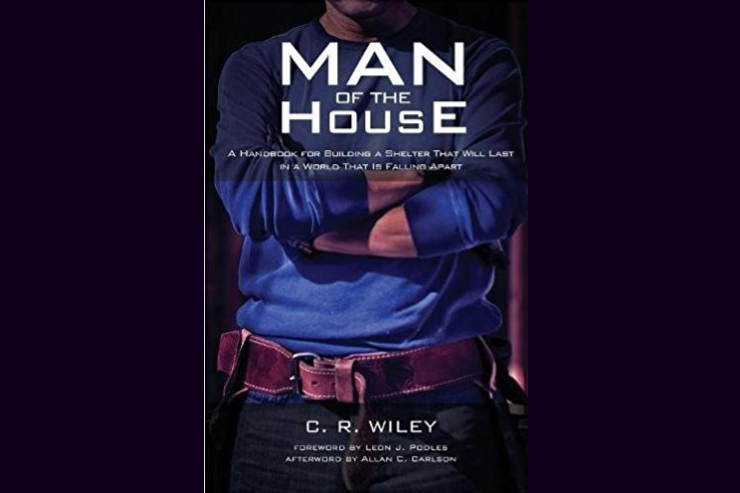 Man of the House
Man of the House
A Handbook For Building A Shelter That Will Last In A World That Is Falling Apart.
C. R. Wiley
Resource Publications (2017)
###
In this age, we are suffering a crisis of fatherhood like no other. Notions of manly virtue, authentic fatherhood and manly leadership have been under attack for so long it is highly unlikely that young men today would recognize or be attracted to the manly virtues necessary to renew our culture. It is increasingly difficult to publically speak about such things as mounting reprisals have the potential even to ruin one’s livelihood should one have the temerity to speak against the current sexual-aberrant orthodoxy dominating the conversation in the public square. This crisis of fatherhood has led to the crisis of the household. We stand witness today to unprecedented attacks on the family and between that and attacks on masculinity, the household is disappearing.
There is one who has dared to take up arms against this sea of troubles. Pastor Christopher Wiley has penned a book very much worth reading for any man, young or old, who desires to be the Man of the House in order to serve his family by way of building a household and society in a way in accord with the natural order of Creation and the natural law. Christopher Wiley is like one crying out from the wilderness. Not only ought we to heed his sage advice in this vital book, we ought to add our voices to a chorus of men who are willing to pick up the mantle of manly virtue and do our part to recover, not just the family, but the household as the recognizable building block of civilized society.
The crisis of manhood, about which Christopher Wiley writes, has been mounting for many generations. The important subtitle of this book is “A Handbook for Building a Shelter That Will Last in a World That IS Falling Apart.” It is obvious that our society is falling apart and the moral norms flowing out of the natural law and the Christian tradition are not only under attack but successfully demonized as antithetical to modern society. What constitutes a man and a woman, two vital constituent parts of the family and the household, are being redefined and reworked to be things they have never been. Confusion reigns supreme as the number of “genders” continues to grow towards triple digits. Truth in accord with natural law is the only possible remedy and we find that Man of the House is a kind of blue print by which we might recover our bearing in this failing society.
One of the most significant aspects of this important book is that Christopher Wiley examines the issues from four referential points of view we might easily associate with the four explanatory causes from Aristotle. From the material aspect he comments with the voice of the Curmudgeon, the boots on the ground reporter of what is materially wrong with the world that this examination of family, man and the household intends to remedy. To understand the formal cause, or the idea of the proper household, he speaks with the voice of the philosopher who gives light to the form of the rightly ordered home. For the efficient cause, or the maker of the home, he speaks with the voice of the craftsman, the one who acts to build the shelter. And for the final cause he speaks as the Paterfamilias who, as the head of the household, acts as the imitator of the one who created us so that by his leadership all members of the household lead good lives in accord with our nature and proper end. It is vital that we let ourselves be guided by these four considerations instead of treating these complex problems as one dimensional.
In Man of the House, Christopher Wiley intends to recover many important truths about human nature, notions of economy, natural law, family and the purpose of society. In doing so, he divides the book into four parts that also fulfills the considerations of the four causes. In part one, he deals with the efficient cause of the household, meaning the proper household is made by sacred traditions, blood covenants, laws, a proper marriage and a proper understanding of economy as the laws that govern the household. He especially emphasizes that the two become one flesh and in the economy of love the fruit of this sacramental union is children who participate in the economy of the household in a way that makes it a shelter against the difficulties of the world. The above mentioned elements are the things by which the proper household is made.
Part two deals with the material aspects of household economics and it begins with property, the land and space to cultivate what makes a household a home. All this requires an understanding of agriculture to understand that we must plant the seeds of truth in our household gardens and allow the roots of tradition fertilized by virtue to produce the fruit that not only sustains the household, but helps all its members flourish as they contribute to the society at large. This is all realized by the matter of work in accord with the laws of nature and the recognition that the household is an imperfect society in need of help, both natural and supernatural.
Part three emphasizes the formal causes of the household and these are best understood by the proper expressions of Justice, gravitas and piety. When it comes to justice, Christopher Wiley reminds us that it is not what others owe us, but what we owe to the other, particularly in light of a proper understanding of authority. We need to recover our sense of civic duty and reclaim equity over false equality and do what justice requires for the common good, which begins in the home but extends to the wider community.
The author explains the necessity of gravitas in a household by its leader. Gravitas is a weight of authority where the authority is acting in accord with natural law. This is the contrary of the power struggle we witness between the sexes today. One can only have gravitas insofar as one has cultivated the intellectual and moral virtues and is prepared to act in justice for the common good. Finally, Christopher Wiley reminds us of the importance of piety in the household and how it is so countercultural today, even unfashionable but in times of old it was understood as the glue that held the household together.
Part four accentuates the final cause of the imperfect society of the household as the essential building block of the wider society capable of being perfect, the society at large. This section focuses on things outside the home like the principalities. There is a natural conflict between a household and a corrupt government because both compete for loyalty from the citizen. It is true however that when things are in their proper order, a government serves households, not the other way around.
Since man is a social animal, friendships in community comprise another end of the well-ordered household for by the three types of friendship elucidated by Aristotle, the society is better ordered. Another institution of friendship is the church and this has real manifestations in the community at large. Finally, the households of today will determine the quality of households tomorrow. So goes the family, so goes the society.
It is a matter of justice to our future children, grandchildren and their children that we recover all the important truths about the nature of the household, the natural laws that govern it and relationships between men and woman as they become families, the framework of a household, the economics of a household, the policies of a household and the households final end as the gold standard for the building blocks of the good society. As is mentioned in the subtitle, this is a world falling apart and Christopher Wiley has intelligently and respectfully put his mind to the root of the problem and our only hope for recovery, the family and household. There is no alternative, we either heed these words or we continue to fall apart. I implore you to get this book The Man of the Household by Pastor Christopher Wiley and begin to cultivate an understanding of the task we have before us if we would recover the right order of things and save this country from the decadence that will end our civilization in the process.














